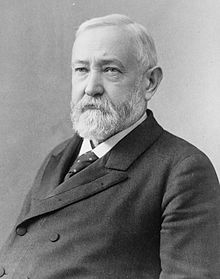

President of the United States
August 20, 1833 North Bend, Ohio, U.S.
March 13, 1901(1901-03-13) (67) Indianapolis, Indiana, U.S.
March 4, 1889 – March 4, 1893
23rd president of the United States (1889–93) This article is about the 23rd president of the United States. For other people with the same name, see Benjamin Harrison (disambiguation). Benjamin HarrisonBenjamin Harrison c. 1895–190023rd President of the United StatesIn office March 4, 1889 – March 4, 1893Vice President Levi P. MortonPreceded by Grover ClevelandSucceeded by Grover ClevelandUnited States Senator from IndianaIn office March 4, 1881 – March 3, 1887Preceded by Joseph E. McDonaldSucceeded by David Turpie Personal detailsBorn(1833-08-20 ) August 20, 1833 North Bend, Ohio, U.S.DiedMarch 13, 1901(1901-03-13) (aged 67) Indianapolis, Indiana, U.S.Resting placeCrown Hill CemeteryPolitical party Whig (before 1856) Republican (1856–1901) Spouse(s) Caroline Scott (m. 1853 ; died 1892 ) Mary Lord Dimmick (m. 1896 ) Children Russell Mary Unnamed Daughter Elizabeth Relatives William Henry Harrison (paternal grandfather) John Scott Harrison (father) Harrison family Education Farmer's College Miami University (BA) OccupationPoliticianlawyerSignatureMilitary serviceAllegiance United StatesBranch/service United States Army (Union Army)Years of service1862–1865Rank Colonel, USV Brevet Brig. Gen., USVUnitArmy of the CumberlandCommands 70th Ind. Infantry Reg. 1st Brigade, 1st Division, XX Corps Battles/warsAmerican Civil War Benjamin Harrison (August 20, 1833 – March 13, 1901) was an American lawyer and politician who served as the 23rd president of the United States from 1889 to 1893. He was a grandson of the ninth president, William Henry Harrison, and a great-grandson of Benjamin Harrison V, a founding father who signed the United States Declaration of Independence. Harrison was born on a farm by the Ohio River and graduated from Miami University in Oxford, Ohio. After moving to Indianapolis, he established himself as a prominent local attorney, Presbyterian church leader, and politician in Indiana. During the American Civil War, he served in the Union Army as a colonel, and was confirmed by the U.S. Senate as a brevet brigadier general of volunteers in 1865. Harrison unsuccessfully ran for governor of Indiana in 1876. The Indiana General Assembly elected Harrison to a six-year term in the U.S. Senate, where he served from 1881 to 1887. A Republican, Harrison was elected to the presidency in 1888, defeating the Democratic incumbent, Grover Cleveland. Hallmarks of Harrison's administration included unprecedented economic legislation, including the McKinley Tariff, which imposed historic protective trade rates, and the Sherman Antitrust Act. Harrison also facilitated the creation of the national forest reserves through an amendment to the Land Revision Act of 1891. During his administration six western states were admitted to the Union. In addition, Harrison substantially strengthened and modernized the U.S. Navy and conducted an active foreign policy, but his proposals to secure federal education funding as well as voting rights enforcement for African Americans were unsuccessful. Due in large part to surplus revenues from the tariffs, federal spending reached one billion dollars for the first time during his term. The spending issue in part led to the defeat of the Republicans in the 1890 midterm elections. Cleveland defeated Harrison for reelection in 1892, due to the growing unpopularity of high tariffs and high federal spending. He returned to private life and his law practice in Indianapolis. In 1899 he represented Venezuela in its British Guiana boundary dispute with the United Kingdom. Harrison traveled to the court of Paris as part of the case and after a brief stay returned to Indianapolis. He died at his home in Indianapolis in 1901 of complications from influenza. Many have praised Harrison's commitment to African Americans' voting rights, but scholars and historians generally regard his administration as below average due to its corruption, as well as focused criticism on his signing of the McKinley Tariff. They rank him in the bottom half among U.S. presidents, though they do not question his commitment to personal and official integrity.

We use cookies
We use cookies and other tracking technologies to improve your browsing experience on our website, to show you personalized content and targeted ads, to analyze our website traffic, and to understand where our visitors are coming from. Privacy Policy.